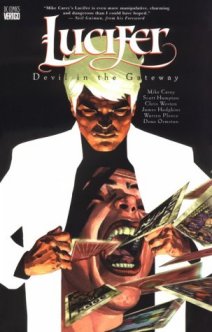| Lucifer:
Devil In The Gateway
Sympathy
for the Devil? Well…okay, yeah.
It's probably
just me, but I've always had a soft spot for the Lord of Darkness.
The man got the rawest of deals: he tried to make a teensy-tiny
change in the administration, and The Man slaps him down into
the fiery pits of Hell. Cold, God. Real cold.
Thankfully,
The Morningstar gets a chance to shine again in his new Vertigo
ongoing series, the first collection of which, Lucifer:
Devil In The Gateway, is an amoralistic romping good read.
For those
uninformed, Lucifer is no longer the ruler of Hell (it happened
in Vertigo's signature book The Sandman). He gave up
the position out of boredom, had his wings cut off by the
Endless Dream, and opened a bar where he frequents the ivory
keys to play a little Billie Holiday. Ahhh, the good life
of a former ruler of Hell.
The first
story in the book, "The Morning Star Option," really
gets the feeling right for the comic. It appears that some
ancient and powerful force has started making people's dreams
come true, only not in the way they hope. Left unchecked,
these wishes might have the power to unravel the reality we've
all grown accustomed to.
As you
can imagine, Heaven isn't very happy about this and would
seek to intervene, but they also don't want to be directly
involved with it. Their third option is Lucifer. For whatever
price he names, Lucifer is sent to investigate.
The thing
I've always enjoyed about Vertigo books is their apparent
lack of need to focus on the titular characters to get a good
story out. Sure we get to see the suave, aloof, and ultimately
scumbag-ish Lucifer do all the things that made him the once
"lighter of worlds" and "Lord of Hell,"
but we also get to see him and the story through the eyes
of the people dragged along for the ride.
Mike Carey,
the writer of the series who has taken a Neil Gaiman character
and made him his own, does this "story by way of bystander"
expertly: firstly in the half-Navajo teen Flower in search
of a way to help her brother, and later in characters like
the Neo-Nazi Karl and the magical adept Elaine. Carey uses
Lucifer sparingly, not letting the character get stale or
repetitive, and keeps the story chugging along nicely.
The art
on this book changes; at present there are five artists credited
for the three different stories. Scott Hampton in the first
story, mentioned above, draws one style that sticks out amongst
the rest. It's the cleanest art in the collection with beautiful
color and it fits the series well. Hampton's work has a misty
quality that meshes wonderfully with the supernatural overtones
of the book.
In all
fairness, you will probably not pick-up this book unless you
are a Vertigo fan. This is a shame because save for the murky
explanation given in the book for why Lucifer left Hell's
office (the collection touches on it, but never in-depth),
this is one of the most accessible books from Vertigo. It
doesn't rely too much on any particular continuity, except
maybe the Bible, and even then, it points out how it went
wrong.
My suggestion:
give Lucifer a try. At $14.95, it would be a sin not to add
it to your collection…or is that the other way around?
Lucifer:
Devil in the Gateway
|






